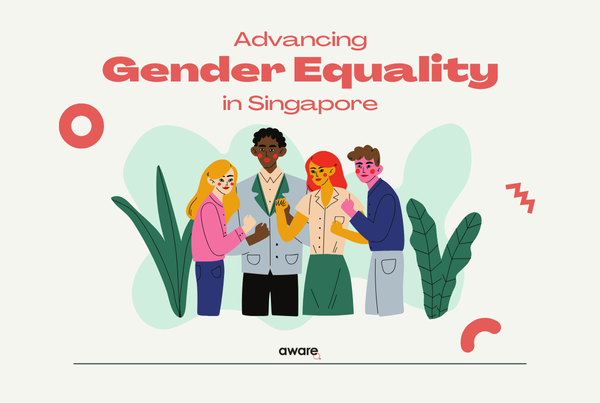-
Advocacy Theme
-
Tags
- Abortion
- Adoption
- Caregiving
- CEDAW
- Disability
- Domestic Violence
- Domestic Workers
- Harassment
- Healthcare
- Housing
- International/Regional Work
- Maintenance
- Media
- Migrant Spouses
- Migrant Workers
- Muslim Law
- National budget
- Parental Leave
- Parenthood
- Polygamy
- Population
- Race and religion
- Sexual Violence
- Sexuality Education
- Single Parents
- Social Support
- Sterilisation
- Women's Charter
Advancing Gender Equality in Singapore: Insights from the CEDAW Committee’s Concluding Observations from the 88th session
August 5th, 2024 | News
Gender equality is a fundamental human right, yet it remains a work in progress in many parts of the world, including Singapore. The United Nations Convention on the Elimination of All Forms of Discrimination Against Women (CEDAW) is a critical international treaty aimed at ending gender discrimination and promoting equality.
Every few years, the CEDAW Committee reviews the progress of countries that have ratified the Convention, offering observations and recommendations to guide them towards greater gender equality. The Committee relies on the work and input of civil society organisations (CSOs) in each country to inform its assessment of the country’s situation and progress. This year, AWARE and 11 other CSOs were in Geneva to be a part of this process.
Recently, the CEDAW Committee released its Concluding Observations for Singapore, providing a comprehensive roadmap for advancing gender equality in our nation. These recommendations, if implemented effectively, will drive significant progress towards ending gender discrimination and promoting equality for all women in Singapore.
Key Issues Highlighted by the CEDAW Committee
The Concluding Observations covered a broad range of issues, many of which were raised by AWARE in our report and in Geneva. Here we break down the key issues related to our areas of advocacy:
- Withdrawal of Reservations: The Committee strongly recommends that Singapore withdraw all remaining reservations to enable the full and effective implementation of the Convention. This would demonstrate a robust commitment to upholding women’s rights and allow for comprehensive enforcement of gender equality measures.
- Anti-Discrimination Protection: A clear and inclusive legal definition of discrimination against women is crucial, said the Committee, and urged the incorporation of such a definition into the Constitution or other appropriate legislation to cover both direct and indirect discrimination in the public and private spheres. AWARE advocated for the inclusion of such a protection in Article 12(2) of the Constitution.
- Combating Gender-Based Violence: The Committee called for the enactment of legislation that criminalises all forms of gender-based violence against women, including domestic and online violence, which should take into account the special protection needs of disadvantaged and marginalised groups of women.
- Addressing Employment Issues:
The Committee recommended that Singapore’s workplace fairness legislation should also cover indirect discrimination, sexual harassment, and discrimination based on congenital and acquired disability, as well as against LBTI women. - Recognising, Reducing and Redistributing Unpaid Care Work:
The Committee recommended recognising, reducing, and redistributing the burden of unpaid care work on women by providing affordable childcare and eldercare services and incentives to balance work and family responsibilities. Unpaid care work disproportionately affects women’s economic opportunities and policies that support affordable care services are crucial for achieving gender equality in the workforce. - Supporting Older Women:
The Committee recommended that Singapore develop measures that address the health, economic, and emotional needs of older women to prevent poverty and isolation, and ensure the availability of affordable care services. - Comprehensive Sexuality Education: The Committee emphasised as a priority the development and implementation of a comprehensive strategy for sexuality education at all educational levels. The curriculum should include gender equality, women’s rights, the harmful effects of gender-based violence, and age-appropriate information focusing on consent and responsible behaviour.
- Addressing Under-representation in Decision-Making: The adoption of temporary special measures, such as quotas and financial incentives, was strongly recommended to accelerate gender parity in leadership roles and enhance women’s representation in decision-making positions.
What Happens Next?
Following the release of the Concluding Observations, the Singapore government is expected to take several steps:
- Dissemination: The government is asked to disseminate the Concluding Observations to its departments, parliament, and the judiciary, to ensure alignment and action across all levels of governance.
- Interim Report: Within the next two years, the government is required to submit a written report to the CEDAW Committee on the progress in four critical areas: (i) strengthening protection against online gender-based violence against women, (ii) comprehensive sexuality education, (iii) protections in the workplace fairness legislation and (iv) women migrant domestic workers. These areas are expected to include the key recommendations of the Committee.
- Next CEDAW Report: Singapore will present its seventh periodic CEDAW report in approximately six to eight years, which will report updates on the implementation of the recommendations in these Concluding Observations.
The Advocacy: Can’t Stop, Won’t Stop
At AWARE, we are committed to continuing our engagement with the government on these matters. The government has indicated a desire for regular engagement with CSOs, and we are encouraged by this commitment.
The first post-CEDAW meeting between CSOs and the Singapore government is scheduled for September, where we will actively participate to advocate for the implementation of the Committee’s recommendations and to hold the government accountable to its obligations. In the meantime, our advocacy efforts will remain focused on key issues such as workplace fairness, gender-based violence, the rights of transnational families, older women and unwed mothers. Notably, we hosted an NGO forum on 20 July to further these discussions, and we plan to publish important research next year on transnational families and coercive control—issues that are deeply connected to the broader struggle for gender equality.




